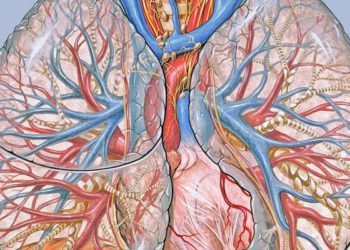Elevated inflammatory biomarkers linked with increased risk of COPD exacerbations
Image: PD
1. Elevated levels of CRP, fibrinogen, and leukocyte count are associated with an increased risk of COPD exacerbations over one year.
2. There was a stepwise increase in the risk of frequent exacerbations over the 1, 3, and 5 year follow-up period based upon the number of biomarkers present.
Evidence Rating Level: 2 (Good)
Study Rundown: This study showed that the combination of elevated levels of C-reactive protein (CRP), fibrinogen, and leukocyte count was associated with a stepwise increased risk of chronic obstructive pulmonary disease (COPD) exacerbations, even in patients with mild disease. The present study is the first study to demonstrate the association between all 3 different inflammatory biomarkers and the risk of frequent COPD exacerbations.
There are several limitations to the study which must be addressed with further research before these biomarkers are used in everyday clinical practice. First, the study includes more mild to moderate COPD cases relative to severe cases, and further validation may be warranted for all subsets of COPD patients. Furthermore, it is possible that there may be omitted cases of mild COPD that were misdiagnosed as acute bronchitis, which could affect the study’s interpretation of inflammatory biomarkers. Nonetheless, this prospective cohort study was well executed and may herald a greater use of inflammatory markers in the management of COPD patients if further studies may validate the findings of this study.
Click to read the study, published today in JAMA
Click to read the editorial, published today in JAMA
Relevant Reading: Global strategy for the diagnosis, management and prevention of chronic obstructive pulmonary disease: GOLD executive summary
In-Depth [prospective, cohort study]: This study selected 8,020 individuals from 2 general population studies in Copenhagen, stratified according to age and Global Initiative for Chronic Obstructive Lung Disease (GOLD) grades 1-4 and A-D. Plasma levels of high sensitivity CRP, fibrinogen, and whole blood leukocyte count were measured, along with exacerbations. Over the first year of follow-up, the odds ratio for frequent exacerbations were 1.5, 2.6, and 6.4 for the 3 respective groups compared to patients without elevated biomarkers (p= 3×10-11). Among 3 groups in comparison to patients without elevated biomarkers, hazard ratios for having at least 1 exacerbation were 1.2, 1.3, and 1.8 (p=2×10-7), respectively. A similar stepwise increase in frequency was seen in the absolute 1 year, 3 year, 5 year risk of frequent exacerbations from none to 3 elevated biomarkers across all GOLD grades A-D, 1-4, and those with history of frequent exacerbations.
By Elizabeth Park and Rif Rahman
More from this author:Trigger exposure in migraine patients results in migraine with aura only in a small subset of patients, Choosing a prenatal diagnostic test: Microarray analysis shown equal to karyotyping,STEMO unit delivery of tpa reduces call to needle time in acute stroke patients,High-dose multivitamin supplements do not decrease disease progression or death in HIV patients receiving HAART ,Pediatric patients not receiving quality palliative care despite agreement between parents and caregivers on valued elements of care ,Combined BRAF and MEK inhibition in metastatic melanoma significantly improves progression free survival
© 2013 2minutemedicine.com. All rights reserved. No works may be reproduced without written consent from 2minutemedicine.com. Disclaimer: We present factual information directly from peer reviewed medical journals. No post should be construed as medical advice and is not intended as such by the authors or by 2minutemedicine.com. PLEASE SEE A HEALTHCARE PROVIDER IN YOUR AREA IF YOU SEEK MEDICAL ADVICE OF ANY SORT. Content is produced in accordance with fair use copyrights solely and strictly for the purpose of teaching, news and criticism. No benefit, monetary or otherwise, is realized by any participants or the owner of this domain.






